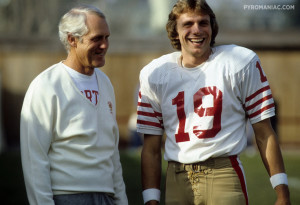September 23rd, 1981
I’m not here to tell you that Bill Walsh is a bad coach. And I’m not here to tell you that Joe Montana can’t possibly succeed in the NFL. It’s just that if they want to still be here in two years, some changes are in order.
Walsh comes from the great Paul Brown coaching tree, and like his mentor, Walsh likes to throw the ball. That strategy, while unconventional, can work well when you have a Hall of Famer like Otto Graham or even a great talent like Ken Anderson. It doesn’t work when you have a scrappy young player like Montana. And lest you forget, Brown never won anything without Graham, and Brown’s Bengals went 55-56-1 with zero playoff wins.
Undeterred by that evidence, Walsh went about bringing Basketball On Cleats to Candlestick Park. Was his first year a success? San Francisco finished third in passing yards, 4th in first downs, and 6th in total yards. Quarterback Steve DeBerg led the NFC in completion percentage, too. But while Walsh’s horizontal passing game led to lots of yards and first downs, the team won only two games. Running backs Paul Hofer and Wilbur Jackson each caught 50 passes, but to what end?
They were two of only nine running backs to hit the 50-catch plateau in 1979, but what good is it passing to your running backs when you can’t attack a defense vertically? In a telling statistic, Baltimore was the only other team to have two running backs catch 50 passes, and the Colts went 5-11. The 49ers ranked 3rd from the bottom in rush attempts that season, but were above average in yards per carry. Maybe somebody should tell The Genius that San Francisco could have benefited from more runs and fewer passes.
The man who thinks he’s the smartest person in every room surely was going to learn from his 1979 failures, right? In 1980, Montana was handed the reins. How did he do? Walsh continued with his horizontal offense: Montana completed 64.5% of his passes, the 4th highest by a quarterback in NFL history (behind the great Ken Stabler and two Brown robots, Anderson and Graham). But the team went just 2-5 in Montana’s starts.
Fullback Earl Cooper was a nice player at Rice, but he was drastically overused by the 49ers last season. In addition to a team-high 171 carries, he caught 83 passes — but for only 567 yards. Cooper became the first player in NFL history to catch 80 balls and not get 700 yards, much less 567 yards. Cooper averaged an anemic 6.8 yards per reception, and prior to last year, no player with fewer than seven yards per catch had come within 20 passes of Cooper’s 83 grabs. In other words, the 49ers relied more heavily on a player doing so little more than any team in NFL history. Sure, the 49ers ranked 5th in passing yards, but they ran just 415 times, the second fewest number in the league. The team led the NFL in pass attempts and went 6-10 with an eight-game losing streak in the middle of the season. Genius.
After two years, some were ready to say the results are in: at 8-24, the 49ers have the worst record of any team since Walsh came to town. Is it all his fault? No, this team was bad when he came here, and I think he’s done some good things. But the outside-the-box thinker needs to get with the tradition of pro football if he wants to win. I thought that was going to happen this year. Sadly, I’m afraid I may be mistaken.
Through three weeks, the 49ers are 5th in passing yards. Montana is leading the NFL in completion percentage. The problem: the team is 1-2, and Montana’s pick six against Atlanta is one of the reasons why. When Jim Plunkett led the Raiders on a magical run a few months ago, he didn’t do it by throwing short passes. Plunkett completed just 53% of his passes, but he averaged 17.1 yards per completion in those four playoff games. For his career, Montana has completed 64% of his passes but averaged a pitiful 10.5 yards per completion. Which approach do you think works better, the one that won the Super Bowl or the guy who has a career record of 3-8?
More importantly, the Raiders ran 141 times in the 1980 playoffs, an averaged of 35.25 per game. Through 35 games of Walsh’s tenure, the 49ers have averaged 37 pass attempts per game and 28 runs. The team is 9-26. Walsh may still be the answer. Heck, Montana may be, too. But the 49ers need to run much more if they want to win. And when they pass, it wouldn’t hurt if they actually threw it downfield.

